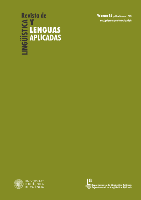
Revista de Linguistica y Lenguas Aplicadas
Scope & Guideline
Connecting Scholars in the World of Linguistics
Introduction
Aims and Scopes
- Interdisciplinary Linguistic Research:
The journal focuses on linguistic studies that intersect with education, psychology, and cultural studies, exploring how language functions in diverse contexts. - Applied Language Studies:
Emphasizing practical applications, the journal publishes research on language acquisition, teaching methodologies, and the use of technology in language education. - Sociolinguistic Investigations:
The journal examines language in its social context, paying attention to issues such as code-switching, language attitudes, and the influence of cultural identity on language use. - Corpus Linguistics and Data-Driven Analysis:
Utilizing corpus-based methodologies, the journal analyzes language patterns and usage across different populations and settings, contributing to linguistic theory and pedagogy. - Innovative Teaching Strategies:
Research on new methodologies in language teaching, including gamification, online learning, and intercultural competence, is a significant focus of the journal.
Trending and Emerging
- Gamification in Language Learning:
Recent studies emphasize the effectiveness of gamified approaches in language education, showcasing how game mechanics can enhance vocabulary learning and student engagement. - Impact of Technology on Language Learning:
Research exploring the role of ICT in language instruction has surged, particularly in the context of pandemic-related adaptations, focusing on online learning and hybrid teaching models. - Intercultural Competence:
There is a growing interest in intercultural competence, particularly in post-pandemic educational settings, as educators seek to prepare students for global communication. - Mental Lexicon and Vocabulary Acquisition:
Emerging studies delve into the mental lexicon, investigating lexical productivity and semantic networks, thus highlighting cognitive aspects of language learning. - Discursive and Sociopolitical Analysis:
An increase in discourse analysis studies, particularly in relation to sociopolitical contexts (e.g., social media discourse) reflects a growing awareness of language's role in shaping public opinion and identity.
Declining or Waning
- Traditional Grammar Instruction:
There is a noticeable decline in research focused solely on traditional grammar instruction methods, as newer, more interactive and communicative approaches gain traction. - Static Language Proficiency Assessment:
Studies centered on static assessments of language proficiency are becoming less common, replaced by dynamic evaluations that consider context and learner engagement. - Prescriptive Language Norms:
Research advocating for prescriptive norms in language use is diminishing, reflecting a broader acceptance of descriptive, usage-based approaches to language. - Focus on Individual Language Skills:
The journal has shifted away from studies that isolate individual language skills (reading, writing, speaking, listening) in favor of more integrated approaches that consider language use in holistic contexts. - Historical Linguistics in Isolation:
There is a reduced emphasis on historical linguistics as a standalone field within the journal, with a growing preference for studies that connect historical aspects with contemporary usage.
Similar Journals
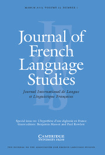
Journal of French Language Studies
Navigating the Evolving Terrain of French LinguisticsJournal of French Language Studies, published by Cambridge University Press, is a prestigious and leading journal in the field of linguistics and language that provides a platform for scholarly articles and research findings relevant to the French language and its various dimensions. With an impressive Q1 ranking in the 2023 categorization and ranked #257 out of 1088 in Scopus for Language and Linguistics, this journal plays a pivotal role in advancing the study of French linguistic methodologies, sociolinguistics, and applied linguistics. Since its inception in 1991, the journal has continually contributed to the academic community, attracting innovative investigations and theoretical discussions that enrich understanding and research in the field. Researchers and students enjoy comprehensive access to critical analysis and emerging trends, and as it continues to converge towards 2024, the journal promises to remain an essential resource for exploring the evolving landscape of French language studies.
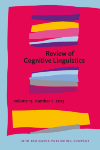
Review of Cognitive Linguistics
Bridging Linguistics and Psychology for a Deeper UnderstandingThe Review of Cognitive Linguistics, published by John Benjamins Publishing Co, is a premier academic journal dedicated to the exploration of cognitive approaches to linguistics. With an ISSN of 1877-9751 and E-ISSN 1877-976X, this journal provides a critical platform for researchers and professionals to disseminate their findings in the rapidly evolving fields of linguistics and language, alongside developmental and educational psychology. Hailing from the Netherlands, the journal boasts impressive standing within the academic community, as indicated by its 2023 Q1 ranking in Linguistics and Language and Q3 in Developmental and Educational Psychology. Additionally, its Scopus rankings reflect a strong position within the arts and humanities and social sciences categories. While currently operating under a traditional access model, this journal actively contributes to the overarching discourse within cognitive linguistics, and is a vital resource for those aiming to deepen their understanding of the intricate link between language and cognition. Researchers, educators, and students are encouraged to engage with the rich body of articles spanning its convergence years from 2010 to 2024, making it an essential read for those at the forefront of these interdisciplinary studies.

RAEL-Revista Electronica de Linguistica Aplicada
Advancing the Frontiers of Applied LinguisticsRAEL-Revista Electronica de Linguistica Aplicada, published by the ASOC ESPANOLA LINGUISTICA APLICADA-AESLA, is a prominent open access journal that has been serving the field of applied linguistics since its inception in 2002. With a dedicated focus on the interplay between language and its practical applications in various contexts, the journal aims to disseminate high-quality research and foster academic discourse among linguists, educators, and policy makers alike. Based in Spain at the Universidad Politécnica de Valencia, RAEL is indexed in Scopus and offers access to a global readership. With a current impact factor reflecting its esteem in the fields of Education, Linguistics, and Social Sciences, the journal ranks in Q3 for linguistics and has achieved significant positioning within its categories. Researchers and students seeking to explore applied linguistic phenomena will find valuable insights and diverse perspectives in its published articles, making RAEL a vital resource in the pursuit of knowledge advancement in this dynamic discipline.

Revista Argentina de Historiografia Linguistica
Exploring the evolution of language through time.Revista Argentina de Historiografia Linguistica, an esteemed academic journal based in Argentina, is dedicated to advancing the field of linguistic historiography. Published by the REVISTA ARGENTINA HISTORIOGRAFIA LINGUISTICA-RAHL, this journal serves as a vital platform for researchers, professionals, and students interested in the study of language history and the evolution of linguistic thought. With a commitment to open access, it promotes widespread dissemination of knowledge, ensuring that valuable insights reach a global audience. The journal aims to publish high-quality, peer-reviewed articles that explore various dimensions of linguistics, including historical language development, sociolinguistics, and language policy. By engaging with a diverse array of topics and methodologies, Revista Argentina de Historiografia Linguistica not only enhances academic discourse within the linguistics community but also fosters interdisciplinary collaboration, making it indispensable for those seeking to deepen their understanding of linguistic heritage and its contemporary significance.
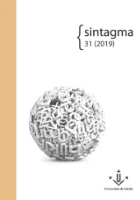
Sintagma
Contributing to the Future of Language Studies.Sintagma is a prominent academic journal dedicated to advancing the field of Linguistics and Language, published by the Universitat de Lleida in Spain. With an ISSN of 0214-9141 and an E-ISSN of 2013-6455, this journal has established itself as an open-access platform since 1989, thereby ensuring wide accessibility and dissemination of research. The journal's commitment to quality is reflected in its ranking within the Q4 quartile of Linguistics and Language in 2021 and a similar standing in Social Sciences and Arts and Humanities, which underscores its emerging importance in these fields despite recent challenges. Covering topics that span theoretical inquiries to applied linguistic studies, Sintagma invites researchers, professionals, and students to contribute to and engage with its evolving landscape from its unique academic perspective. With the convergence of research years from 2011 to 2018 and upcoming issues through 2024, the journal remains poised to provide insightful content that addresses the linguistic dimensions of contemporary society.

Circulo de Linguistica Aplicada a la Comunicacion
Exploring the Intersection of Language and CommunicationCirculo de Linguistica Aplicada a la Comunicacion is a premier open-access journal published by UNIV COMPLUTENSE MADRID, SERVICIO PUBLICACIONES, since 2000, that serves as a vital resource for researchers, professionals, and students in the fields of linguistics and language studies. With an ISSN of 1576-4737, this journal is recognized for its rigorous scholarship and has achieved a notable Q1 quartile ranking in Linguistics and Language as of 2023. The journal's impact extends across diverse domains, holding significant positions in both the Arts and Humanities and Social Sciences categories, ranking #354/1088 and #419/1167 in Scopus, respectively. It features a rich array of research articles that delve into applied linguistics, communication theories, and language pedagogy, creating a comprehensive platform for academic discourse. By fostering collaboration and innovation in language research, Circulo de Linguistica Aplicada a la Comunicacion remains a crucial contributor to the enrichment of knowledge and understanding within the global linguistic community.
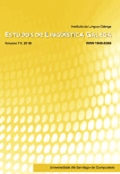
Estudos de Linguistica Galega
Advancing Understanding of Linguistic DiversityEstudos de Linguistica Galega, an esteemed journal published by the University of Santiago de Compostela, provides a critical platform for scholars engaged in the vibrant field of linguistics, particularly focusing on the Galician language and its surrounding linguistic phenomena. Launched in 2009, this Open Access journal enables unrestricted dissemination of research, facilitating engagement from a global audience. With an impact factor that positions it within the Q4 quartile in Linguistics and Language, it reveals a strong commitment to advancing the discourse in this niche. It ranks #691 out of 1088 in the Arts and Humanities category, underscoring its relevance in the academic landscape. The journal aims to foster collaboration and innovation among researchers and practitioners, making significant contributions to understanding linguistic diversity and its implications in contemporary society. Located in Santiago de Compostela, Spain, the journal encourages submissions that explore theoretical, empirical, and applied linguistic studies, thereby inviting researchers, professionals, and students to contribute to this growing field.

Turkic Languages
Exploring the Rich Tapestry of Turkic LinguisticsTurkic Languages is an esteemed academic journal published by HARRASSOWITZ VERLAG, dedicated to the exploration and analysis of Turkic languages within the broader fields of linguistics and language studies. With an ISSN of 1431-4983, this journal serves as a vital platform for researchers, professionals, and students interested in the intricate structures, dynamics, and cultural contexts of Turkic languages. Although it currently operates without an Open Access option, the journal's commitment to quality research is evident in its placement within the Q4 category of Linguistics and Language for 2023, alongside its Scopus rankings where it stands in the 30th and 26th percentiles for Language and Linguistics across Arts and Humanities and Social Sciences, respectively. The journal's scope encompasses a variety of linguistic phenomena, striving to foster a deeper understanding of Turkic languages and their significance in the global linguistic landscape. With converged years from 2017 to 2022, Turkic Languages continues to uphold its reputation as a crucial resource for advancing scholarship in this specialized field.
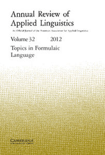
Annual Review of Applied Linguistics
Elevating scholarship in applied linguistics.The Annual Review of Applied Linguistics, published by Cambridge University Press, stands as a premier journal in the realm of linguistics and psychology, with an impressive impact factor identifying its significance: ranking in the Q1 quartile across both fields in 2023. With an ISSN of 0267-1905 and an E-ISSN of 1471-6356, this journal endeavors to provide comprehensive and insightful reviews covering an array of topics within applied linguistics, thus supporting researchers, professionals, and students in advancing their understanding and expertise. Operating from its base in Cambridge, United Kingdom, the journal has maintained a consistent commitment to scholarly excellence since its inception, accelerating discussions on critical issues and emerging research trends from 2005 to 2024. Notably, it holds a prestigious position in Scopus, ranked #26 in Language and Linguistics and #30 in Social Sciences, showcasing its influence and contribution to the scholarship in the field. The Annual Review of Applied Linguistics thus stands as an essential resource for anyone engaged in linguistic research and application.

LFE-Revista de Lenguas para Fines Especificos
Connecting Educators and Researchers in Language StudiesLFE-Revista de Lenguas para Fines Especificos is a distinguished academic journal focused on the field of applied linguistics and language education, published by UNIV LAS PALMAS GRAN CANARIA, SERV PUBL & DIF CIENT PARQUE CIENT. Established in 1993, this Open Access journal promotes the dissemination of research on specific purposes in language studies, making it an invaluable resource for researchers, educators, and students alike. Based in Spain, it serves an international audience interested in the intersection of language acquisition, pedagogy, and professional communication. Despite its recent entry into Scopus with competitive rankings in Social Sciences, particularly in Linguistics and Language and Education, the journal aims to continually enhance its impact by inviting innovative contributions that explore contemporary challenges and methodologies in language teaching and learning. Researchers are encouraged to tap into this growing repository of knowledge, which is easily accessible to foster collaborative and interdisciplinary dialogues within the field.